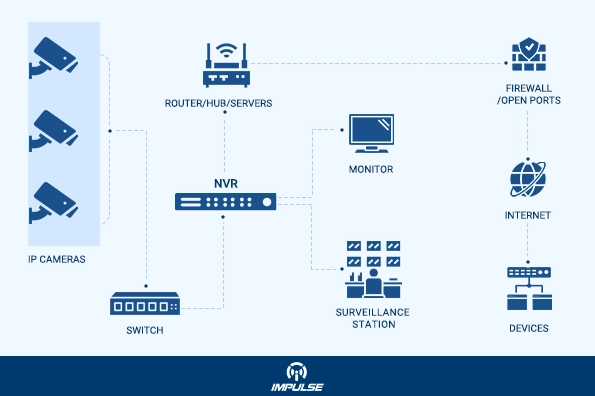In today’s digital age, surveillance systems have transcended traditional analog cameras, evolving into highly intelligent, connected solutions powered by advanced technologies. The Network Video Recorder (NVR) is at the forefront of this revolution, acting as the backbone for smart storage and management in modern video surveillance systems. For technical professionals, understanding the intricate workings of an NVR is crucial for optimizing security infrastructure.
What is a Network Video Recorder (NVR)?
A Network Video Recorder (NVR) is a specialized device designed to record video from IP (Internet Protocol) cameras and store it on a hard disk, networked storage, or cloud. Unlike older Digital Video Recorders (DVRs) that work with analog cameras, NVRs exclusively work with digital cameras, making them more flexible, scalable, and efficient.
NVRs are essential for IP-based video surveillance systems, offering advanced features such as intelligent video analytics, remote viewing, and seamless integration with other security devices. With the rising demand for smart security solutions, NVRs are rapidly becoming the standard in both commercial and industrial sectors.
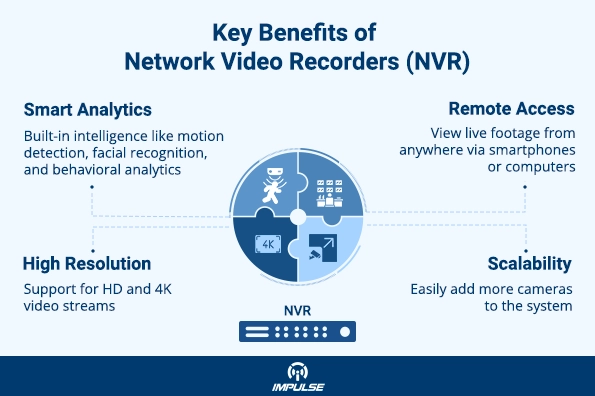
How Does an NVR Work?
The NVR camera system operates on the same network as the IP cameras, transmitting footage through a local network or the internet. Here’s how it typically works:
- Data Collection: IP cameras capture high-resolution video footage and send it digitally via an Ethernet connection.
- Data Transmission: The video data is transmitted to the NVR over a secure network.
- Recording: NVR stores this data on local storage devices like HDDs or external network storage units, organizing the footage by timestamp, camera ID, or event-based triggers.
- Smart Management: The NVR can analyze the footage using video analytics, such as motion detection, line crossing, or object removal detection.
Key Features of NVR Systems
1. High-Resolution Video Recording
One of the most significant advantages of NVRs over traditional DVRs is their ability to record in higher resolutions. They support full HD, 4K, and even higher, depending on the camera’s capabilities. This is critical for environments requiring detailed image analysis, such as airports, banks, and industrial facilities.
2. Remote Access and Control
Technical professionals can monitor and control NVRs remotely via mobile apps or desktop software. This flexibility ensures that the surveillance system remains operational and can be managed even when off-site. This feature is especially valuable for smart video surveillance systems installed in multiple locations.
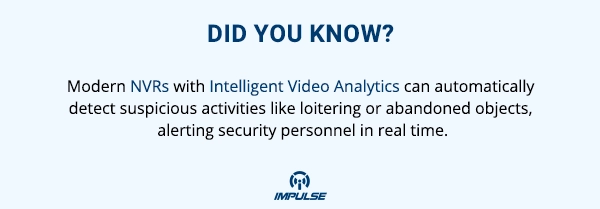
3. Smart Storage Management
NVRs come equipped with features that help optimize storage usage. The most common methods include:
- H.265+ Video Compression: Reduces the file size without sacrificing image quality, enabling longer video retention periods.
- Motion Detection Recording: Only records when motion is detected, saving storage space.
- Storage Redundancy: Many NVRs support RAID (Redundant Array of Independent Disks) to ensure video data is not lost in case of drive failure.
4. Integration with Existing Systems
NVRs can integrate seamlessly with existing IP-based devices, including Access Control Systems, alarms, and even third-party analytics software. This creates a comprehensive surveillance ecosystem that can be customized for various security needs.
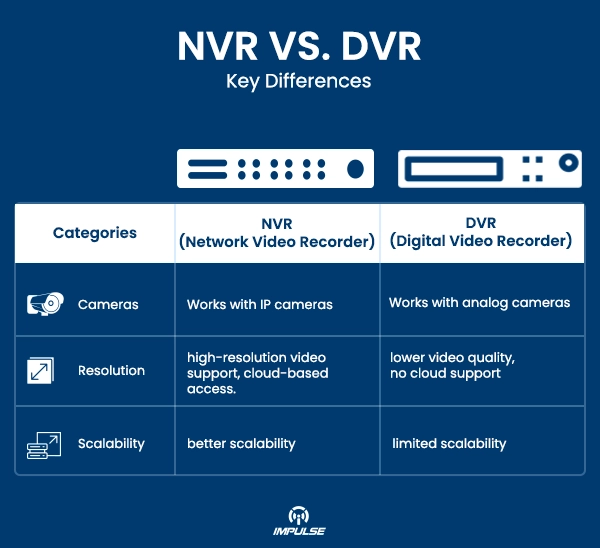
Also read: Choosing Between NVR and DVR for Your Security Camera System
Applications of NVRs in Modern Surveillance
1. Commercial and Industrial Use
NVRs are extensively used in commercial settings such as offices, malls, and industrial plants. Their ability to integrate with best NVR camera systems and intelligent NVRs makes them a preferred choice for professionals looking to enhance security across multiple sites.
2. Healthcare Facilities
Hospitals, clinics, and other healthcare institutions use NVRs to monitor high-risk areas, protect sensitive information, and ensure the safety of patients and staff.
3. Educational Institutions
Schools and universities utilize NVR camera setups for campus surveillance. Intelligent NVR systems can monitor student activities and provide real-time alerts during emergencies.
NVR Camera Setup: What You Need to Know
Setting up an NVR camera system involves several crucial steps to ensure it works optimally:
- Camera Compatibility: Ensure the NVR supports the specific IP camera models you are using. Modern NVRs are typically ONVIF-compliant, meaning they can work with any ONVIF-compliant camera.
- Network Bandwidth: Ensure your network infrastructure can handle the data load from multiple high-resolution cameras without causing latency or packet loss.
- Storage Considerations: Estimate the total storage requirement based on the number of cameras, resolution, and retention period. Use NVRs with RAID support for redundancy.
- Cloud or Local Storage: Some NVRs offer cloud backup options, but this can increase bandwidth requirements. Assess whether cloud or local storage suits your security needs.
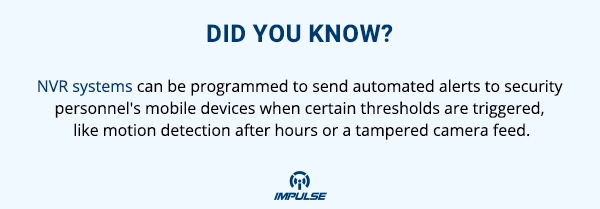
Best Practices for Choosing the Right NVR System
To select the best NVR camera system for your environment, consider the following factors:
1. Camera Support
Choose an NVR that supports a wide range of cameras, especially if you plan to upgrade your system in the future. Look for NVR for CCTV cameras that offer multi-camera support, ideally up to 16 or 32 channels.
2. Storage Scalability
For large-scale surveillance, storage is a crucial consideration. The best NVR camera system will offer scalable storage solutions with options to expand via external storage devices or cloud storage integration.
3. Video Analytics
Opt for NVR systems that come with built-in Intelligent Video Analytics. These tools offer advanced monitoring features like facial recognition, vehicle detection, and behavior analysis, making it easier for professionals to respond to threats proactively.
4. Ease of Use
Despite being a professional-grade solution, NVRs should still offer user-friendly interfaces, allowing technical teams to monitor, configure, and manage the system with ease.
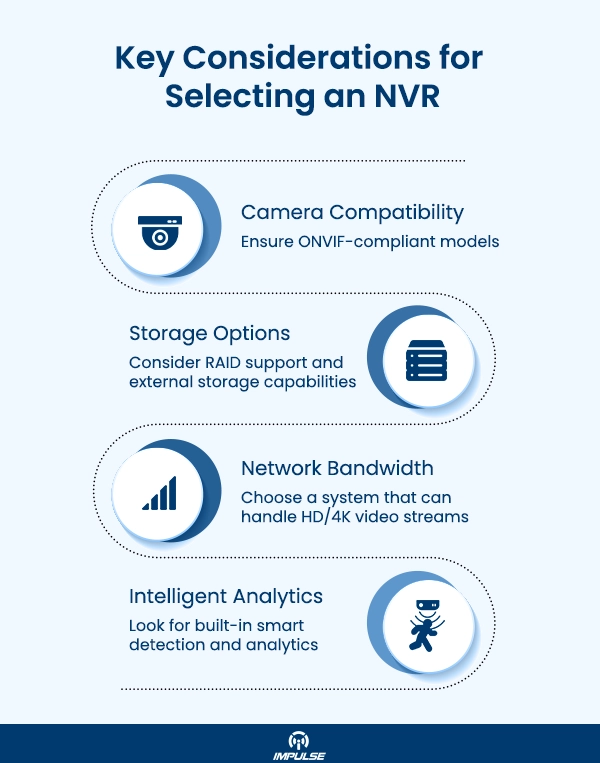
Conclusion:
The Network Video Recorder (NVR) has revolutionized modern IP-based surveillance systems, offering advanced features like remote monitoring, smart storage management, and seamless integration with existing security infrastructure. NVRs provide superior performance, reliability, and scalability, making them the preferred choice across various sectors including commercial, healthcare, and educational institutions.
Looking ahead, the future of NVRs is promising, with advancements in AI and machine learning. Intelligent NVRs with sophisticated video analytics are set to push the boundaries of video surveillance. By offering a future-proof solution adaptable to evolving security needs, NVRs represent a paradigm shift in surveillance and security approaches.
NVRs are indispensable for modern IP-based surveillance systems, offering smart solutions for professionals aiming to future-proof their security setups. From industrial applications to commercial facilities, NVRs deliver top-tier performance and scalability, making them the go-to choice for technical professionals.
Explore Impulse CCTV’s range of NVR camera systems to find the best solution for your needs.


